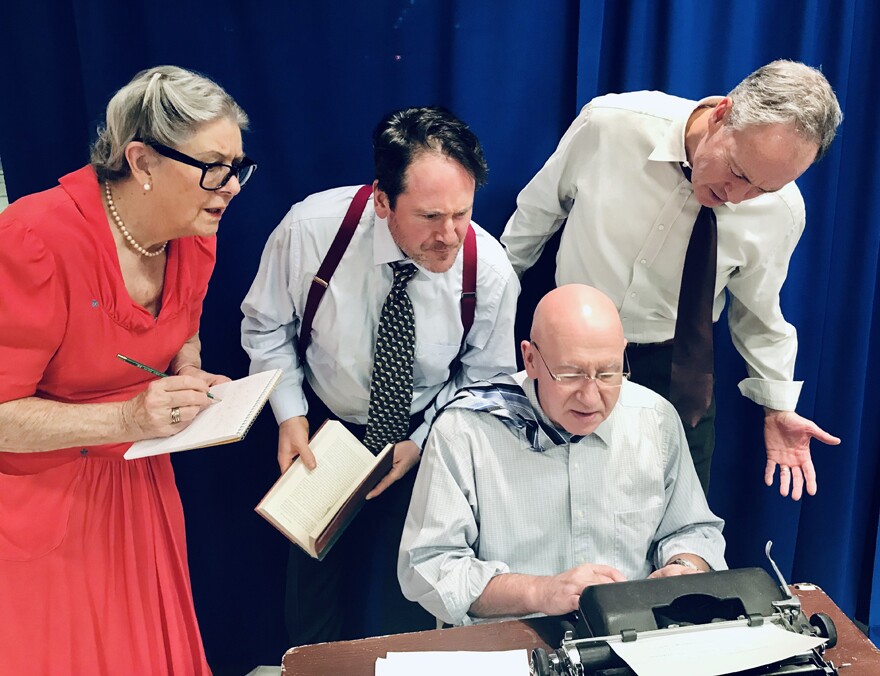Conventional wisdom states that the success of any production of a play starts and ends with the casting.
What you have to know about “Moonlight and Magnolias” playing at Home Made Theater in Saratoga Springs through Sunday is that it is billed as a comedy and the actors aren’t funny.
The good news is that though the men show little flair for comedy, they do find substance in the plays more thoughtful moments.
You see, “Moonlight and Magnolias” is as much a play about the creative process of making a film, or for that matter, any collaborative art form. It is also an homage to the pioneers of the film industry during its infancy. When the play dwells on these aspects the actors are more than capable.
The premise is that David Selznick who is producing “Gone With the Wind” realizes that after three weeks of filming, he has a potential disaster on his hands.
He replaces the director and calls in the tyrannical but technically brilliant Victor Fleming who is in the final weeks of shooting “The Wizard of Oz”.
Next, he hires Ben Hecht, the best script doctor in Hollywood to fix the script. Selznick locks himself and the other two men in his office for five days in order to create a filmable product.
It’s an idea rich with potential as the three men couldn’t be more different. Selznick is a driven man who needs a successful film.
Hecht is a socially conscious individual who sees making films as a way to shape a nations attitude towards injustice.
Fleming is an egomaniac who cares little a about those under his control and is only interested in how the finished product looks on the screen.
Their conflicting personalities united by a common goal can be the ideal situation for a farcical situation.
Sadly, it soon becomes obvious that the three actors have little or no onstage chemistry. Except for Joe Frederick as Selznick there is little energy on stage. Their banter and asides fail to generate laughs and director Teresa Storti does not find the pace the play needs. Everything seems forced and artificial.
Michael J. Madsen as Hecht is passive to the point of being almost invisible. Instead of a man who shows his intellectual superiority through witty and incisive wise-cracks Madsen plays him as a tired crank.
Fleming was a macho, tough individual, and John Love strikes a masculine image but is not offer the win-at-any-cost portrayal the role demands.
Indeed, when he addresses the still persistent rumor that he actually slapped a young Judy Garland on the set of “The Wizard of Oz,” he defends himself saying, “It was only once.”
Instead of funny its shocking. Indeed, at that moment he not only loses the respect of every gay man in the audience, he also offended all parents and grandparents in the house.
Selznick is desperate for a hit and believes his job is to give the public what it wants. Since Hecht hasn’t read the book, he goes so far as to act out the scenes with Fleming so Hecht can understand the essentials of what he calls a melodrama.
Frederick is the strongest actor on stage, but his blustering delivery needs some modulation and it, like the material, becomes extremely repetative.
Hecht has a social conscience. As a Jew he is aware in 1939 the danger of whitewashing slavery while the Nazi’s are taking over Europe. He appeals to Selznick who also Jewish to make a film that shows the evils of mistreating and dominating other races, religions and creeds.
In these non-comic scenes the actors do well as they find the sincerity within the dilemma They want to make a good film from what they consider a bad book. When completed, all but Selznick believe the film will be a failure.
Where playwright Ron Hutchinson truly succeeds is making fun of the flaws in the book. Another nice touch is adding Selznick’s secretary Miss Poppenguhl entering in the room with bananas and peanut for the three to eat.
Dianne O’Neil’ plays her as an ever patient, exhausted soul which offers a few smile and an occasional laugh.
It’s all played on a functional set designed by Kevin Miller. Costumes are also by O’Neill and though the suits set a period, they do little in establishing the individual personality of the characters.
Just like the entire production, the tech is capable without being distinguished.
“Moonlight and Magnolias” continues Friday through Sunday at the Dee Sarno Theater 320 Broadway in Saratoga Springs. For tickets, schedule and COVID protocol go homemadetheater.org or call 518-587-4427.
Bob Goepfert is theater reviewer for the Troy Record.
The views expressed by commentators are solely those of the authors. They do not necessarily reflect the views of this station or its management.





